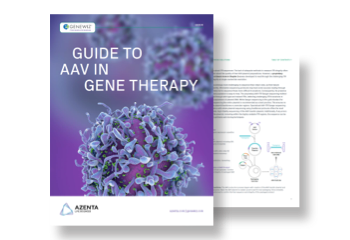AAV Packaging Service
AAV Packaging services center around GENEWIZ from Azenta’s proprietary AAV Vector Production process to provide industry-leading project quality, completion time, and flexibility. The adeno-associated virus (AAV) is a powerful vehicle for cell and gene therapy. However, working with AAV vectors can be challenging. Each construct contains two inverted terminal repeat (ITR) sequences which are notoriously unstable, but also critical to the replication and encapsidation of viral DNA. Our support for AAV-based research and therapeutic applications enables us to deliver results for any AAV challenge.
How is the AAV genome packaged?
The AAV genome is packaged by using two copies of inverted terminal repeats (ITR) to flank the expression cassette and facilitate vector DNA replication as single-stranded DNA (ssDNA) and packaging into empty preformed capsids. Small rep proteins are needed to assist in the translocation of the AAV genome into the capsid.
AAV genome packaging components are:
- Assembled empty capsids
- Completed replication of AAV genomes
- Rep proteins to translocate the AAV genome into the capsid
What is the packaging capacity for AAV?
Adeno associated viruses (AAVs) have a packaging capacity of roughly 4.7kb, which is approximately half the packaging limit of vectors from lentiviruses and adenoviruses.
Applications of AAV Vectors
AAV Packaging Workflow
With expertise in Sanger and NGS sequencing, gene synthesis, viral packaging, and more, GENEWIZ has the capabilities and flexibility to partner with you for research success at any stage of your workflow. This means confidence and reliability in your product quality with the convenience of a single team for consultation and service experience. Our total packaging workflow below connects the novel advantages of our research groups to bring you AAV success.
Featured Application: AAV for Therapeutic Delivery
Adeno-associated virus (AAV) is a promising gene therapy vector due to its low pathogenicity and immunogenicity. It can deliver a genetic payload of up to 4.7 kb, and multiple serotypes are available to target specific cell types or tissues in humans. The recombinant AAV (rAAV) genome comprises a transgene construct flanked by a pair of 145 bp inverted terminal repeat (ITR) sequences. Previous reports have shown that the ITRs are necessary to produce viral particles, but their structure is problematic for conventional cloning workflows. ITR sequences in plasmids are unstable, often acquiring deletions during propagation in bacteria. Because of the high risk of mutation, sequence verification of ITR sequences is a critical part of rAAV quality control. This too is challenging, however, as standard Sanger sequencing fails to read through most ITR sequences. Here, we study the effect of partial and full ITR deletions on AAV packaging and show how proprietary methods developed by GENEWIZ can successfully detect and repair these mutations.

AAV-ANCED STRATEGIES
For Adeno-Associated Virus in Gene Therapy
✓ Reliable quality control and safety testing for AAV development
✓ Strategies to read through inverted terminal repeats in AAV
✓ High-fidelity methods for AAV plasmid prep and packaging
✓ Advanced sequencing for AAV quality and safety monitoring
Features and Benefits
AAV Packaging Deliverables
AAV particles have a packaging capacity of approximately 4.7 kb and are provided in PBS buffer1. They are shipped on dry ice and aliquoted in custom vialing sizes for convenient storage and use.
| Featured AAV Serotypes2 | Volume | Estimated Completion Time | Quality | Titer3 | Yield |
|---|---|---|---|---|---|
| Normal yield: 1, 3b, 5, 7, 8, 9, rh10, PHP.eB, PHP.B, AAVDJ, retro, PHP.S, Olig001, Olig001-PHPA, AAVie | 200 uL |
In as few as 3-4 weeks |
– Ultrapure (≥95% by SDS-PAGE) | 1 x 1013 GC/mL |
Up to 1 x 1016 GC |
| 500 uL | |||||
| Low yield: 2, 4, 6, 6.2, 7m8, AAV ShH10, AAV6 [Y705F,Y731F] | 1 mL | – Low endotoxin (<10 EU/mL) | |||
| Custom (up to 100 mL) |
1. AAV packaging solutions can use GENEWIZ or customer-supplied plasmids.
2. GENEWIZ is continually developing new serotypes through research efforts. Contact our project management team to learn more.
3. Standard quality control includes titer determination by qPCR with ITR primers. Optional dPCR and TEM analysis available.


